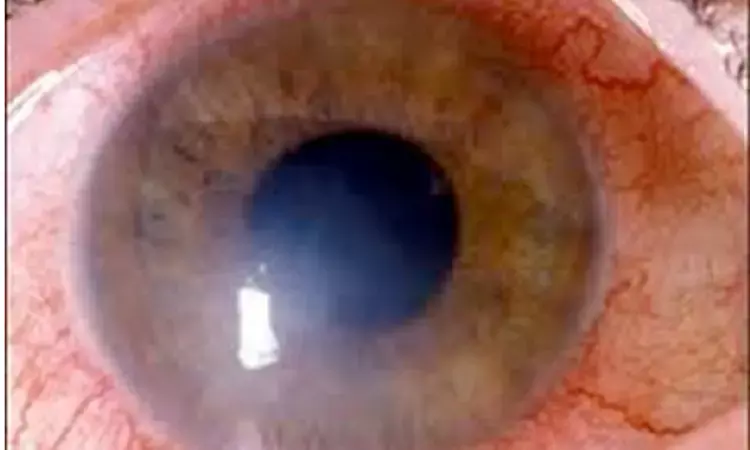- Home
- Medical news & Guidelines
- Anesthesiology
- Cardiology and CTVS
- Critical Care
- Dentistry
- Dermatology
- Diabetes and Endocrinology
- ENT
- Gastroenterology
- Medicine
- Nephrology
- Neurology
- Obstretics-Gynaecology
- Oncology
- Ophthalmology
- Orthopaedics
- Pediatrics-Neonatology
- Psychiatry
- Pulmonology
- Radiology
- Surgery
- Urology
- Laboratory Medicine
- Diet
- Nursing
- Paramedical
- Physiotherapy
- Health news
- Fact Check
- Bone Health Fact Check
- Brain Health Fact Check
- Cancer Related Fact Check
- Child Care Fact Check
- Dental and oral health fact check
- Diabetes and metabolic health fact check
- Diet and Nutrition Fact Check
- Eye and ENT Care Fact Check
- Fitness fact check
- Gut health fact check
- Heart health fact check
- Kidney health fact check
- Medical education fact check
- Men's health fact check
- Respiratory fact check
- Skin and hair care fact check
- Vaccine and Immunization fact check
- Women's health fact check
- AYUSH
- State News
- Andaman and Nicobar Islands
- Andhra Pradesh
- Arunachal Pradesh
- Assam
- Bihar
- Chandigarh
- Chattisgarh
- Dadra and Nagar Haveli
- Daman and Diu
- Delhi
- Goa
- Gujarat
- Haryana
- Himachal Pradesh
- Jammu & Kashmir
- Jharkhand
- Karnataka
- Kerala
- Ladakh
- Lakshadweep
- Madhya Pradesh
- Maharashtra
- Manipur
- Meghalaya
- Mizoram
- Nagaland
- Odisha
- Puducherry
- Punjab
- Rajasthan
- Sikkim
- Tamil Nadu
- Telangana
- Tripura
- Uttar Pradesh
- Uttrakhand
- West Bengal
- Medical Education
- Industry
Lateral-flow device alternative standard of care for the point-of-care diagnostics for microbial keratitis

Microbial keratitis (MK) is a common cause of unilateral visual impairment, blindness, and eye loss in low-income and middle-income countries. There is an urgent need to develop and implement rapid and simple point-of-care diagnostics for MK to increase the likelihood of good outcomes. To evaluate the diagnostic performance of the Aspergillus-specific lateral-flow device (AspLFD) to identify Aspergillus species causing MK in corneal scrape and corneal swab samples of patients presenting with microbial keratitis.
This diagnostic study was conducted between May 2022 and January 2023 at the corneal clinic of Aravind Eye Hospital in Madurai, Tamil Nadu, India. All study participants were recruited during their first presentation to the clinic. Patients aged 15 years or older met the eligibility criteria if they were attending their first appointment, had a corneal ulcer that was suggestive of a bacterial or fungal infection, and were about to undergo diagnostic scrape and culture.
Sensitivity and specificity of the AspLFD with corneal samples were collected from patients with MK. During routine diagnostic scraping, a minimally invasive corneal swab and an additional corneal scrape were collected and transferred to aliquots of sample buffer and analyzed by lateral-flow device (LFD) if the patient met the inclusion criteria. Photographs of devices were taken with a smartphone and analyzed using a ratiometric approach, which was developed for this study. The AspLFD results were compared with culture reports.
The 198 participants who met the inclusion criteria had a mean (range) age of 51 (15-85) years and included 126 males (63.6%). Overall, 35 of 198 participants with corneal scrape (17.7%) and 17 of 40 participants with swab samples (42.5%) had positive culture results for Aspergillus species. Ratiometric analysis results for the scrape samples found that the AspLFD achieved high sensitivity (0.89; 95% CI, 0.74-0.95), high negative predictive value (0.97; 95% CI, 0.94-0.99), low negative likelihood ratio (0.12; 95% CI, 0.05-0.30), and an accuracy of 0.94 (95% CI, 0.90-0.97). Ratiometric analysis results for the swab samples showed that the AspLFD had high sensitivity (0.94; 95% CI, 0.73-1.00), high negative predictive value (0.95; 95% CI, 0.76-1.00), low negative likelihood ratio (0.07; 95% CI, 0.01-0.48), and an accuracy of 0.88 (95% CI, 0.73-0.96).
Results of this diagnostic study suggest that AspLFD along with the ratiometric analysis of LFDs developed for this study has high diagnostic accuracy in identifying Aspergillus species from corneal scrapes and swabs. This technology is an important step toward the provision of point-of-care diagnostics for MK and could inform the clinical management strategy.
Source: Gunasekaran R, Chandrasekaran A, Rajarathinam K, et al. Rapid Point-of-Care Identification of Aspergillus Species in Microbial Keratitis. JAMA Ophthalmol. Published online September 28, 2023. doi:10.1001/jamaophthalmol.2023.4214
Dr Ishan Kataria has done his MBBS from Medical College Bijapur and MS in Ophthalmology from Dr Vasant Rao Pawar Medical College, Nasik. Post completing MD, he pursuid Anterior Segment Fellowship from Sankara Eye Hospital and worked as a competent phaco and anterior segment consultant surgeon in a trust hospital in Bathinda for 2 years.He is currently pursuing Fellowship in Vitreo-Retina at Dr Sohan Singh Eye hospital Amritsar and is actively involved in various research activities under the guidance of the faculty.
Dr Kamal Kant Kohli-MBBS, DTCD- a chest specialist with more than 30 years of practice and a flair for writing clinical articles, Dr Kamal Kant Kohli joined Medical Dialogues as a Chief Editor of Medical News. Besides writing articles, as an editor, he proofreads and verifies all the medical content published on Medical Dialogues including those coming from journals, studies,medical conferences,guidelines etc. Email: drkohli@medicaldialogues.in. Contact no. 011-43720751


